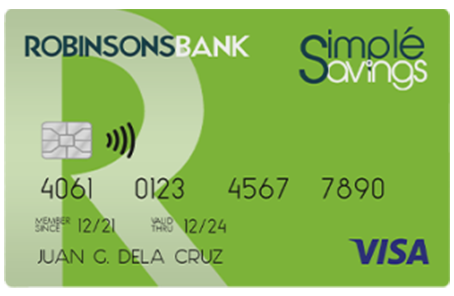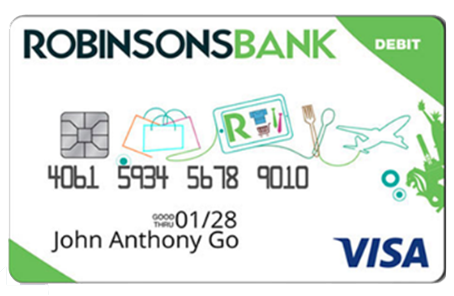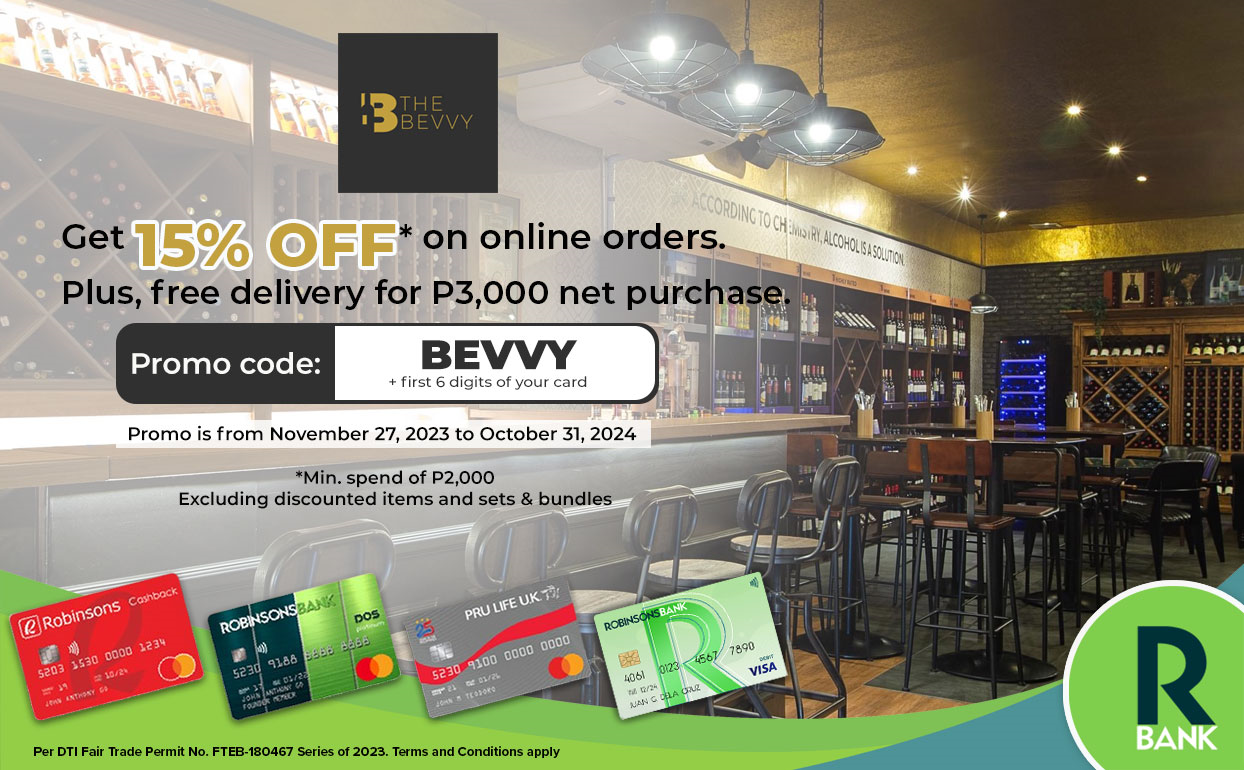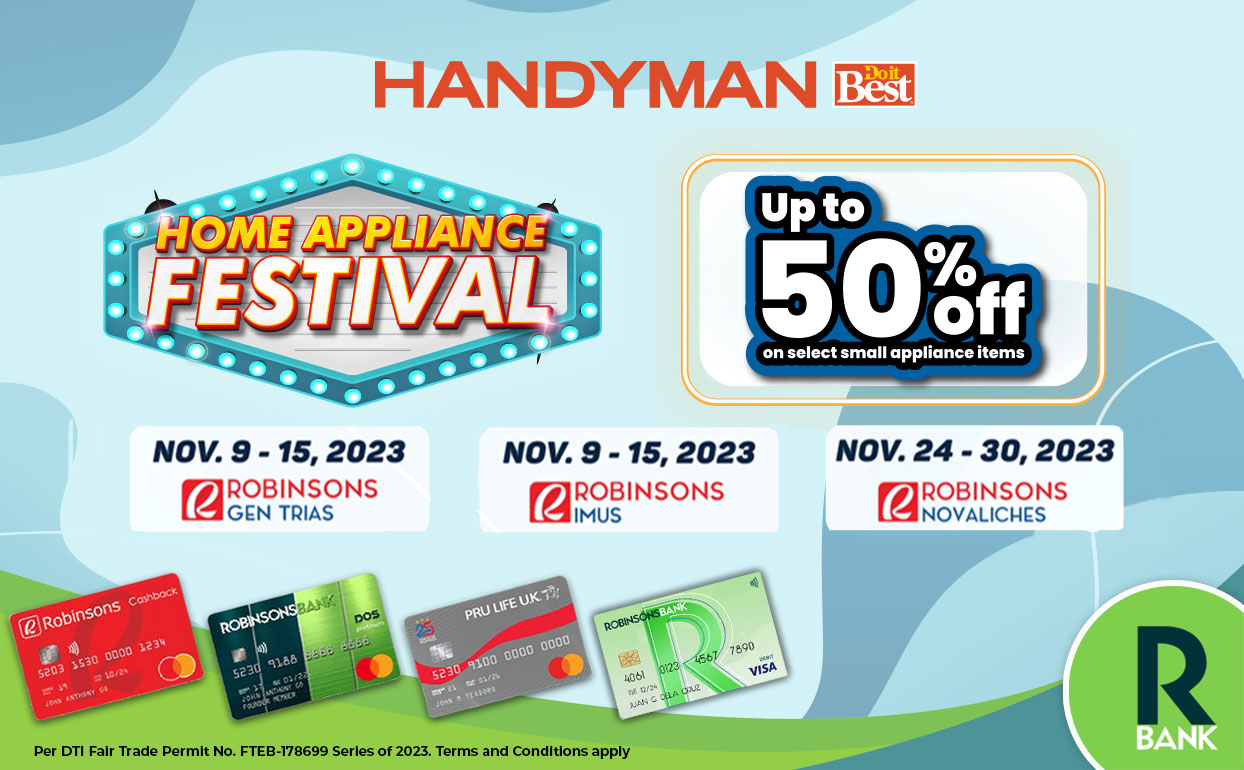Simple' Savings
Visa Debit Card
You can now do anything you want online with the use of Simple’ Savings card
Robinsons Bank
Visa Debit Card
Enjoy the best moments in the limitless world of entertainment, travel and more!
Promos
Terms and Conditions The promo is open to all Robinsons Bank Credit and Debit Cardholders of good standing*and
Terms and Conditions The promo is open to all Robinsons Bank Credit and Debit Cardholders of good standing*and
Terms and Conditions The promo is open to all Robinsons Bank Credit and Debit Cardholders of good standing*and
Terms and Conditions: 1. The promo is open to all Robinsons Bank Debit, and Robinsons Bank UNO, DOS,
Terms and Conditions: 1. The promo is open to all Robinsons Bank Debit, and Robinsons Bank UNO, DOS,
Terms and Conditions: 1. The promo is open to all Robinsons Bank Debit, and Robinsons Bank UNO, DOS,
Quick Guide to Debit Cards
What Is A Debit Card?
A debit card is a plastic payment card that its owner can use to make cashless purchases.
The debit card is always linked to its own respective bank account, where it deducts the amount in the purchase from the bank account’s remaining balance. Today, ATM cards issued by banks also double as debit cards. As a result, they can be used to both withdraw cash at any of the bank’s ATMs nationwide and also to make cashless transactions.
As long as you have a bank account of your own, you can easily have a debit card from that same issuing bank. However, remember that it’s your responsibility to track your expenditures with the card and to make sure your account balance never goes below the required minimum.
Debit Card Vs. Credit Card: Which One Is Right For You?
Debit cards are often pitted against credit cards, but the truth is, both can be very useful financial tools.
Before you choose one over the other, you should think about the difference between the two, how well they’ll fit your lifestyle, and how focused they can keep you on fulfilling your own financial goals.
The chief difference between a debit card and a credit card is the source of funds. Whereas a debit card deducts the amount due directly from your bank account, a credit card will charge against your monthly credit limit, or the maximum amount of money you can borrow per month.
Time is also an issue between debit cards and credit cards. With a debit card, you pay right away with the money you have on hand in your account, and then the purchase is settled. But with a credit card, you can choose to settle the payments at the end of the month or pay for certain ongoing purchases in installments.
Again, neither a debit card nor a credit card is superior to the other by default. They both have their benefits and disadvantages. But it may be wiser to choose one over the other to match your circumstances, the types of purchases you can foresee yourself making, and the financial goals you’ll want to achieve in the next few years.
If you anticipate making important and costly purchases for yourself or your family—for example, for household appliances or travel accommodations—then a credit card is the way to go. A credit card will enable you to make these purchases without being tied to a strict limit. If you spend wisely and pay your credit card bills in a consistent manner, you may also have the opportunity to build your credit history. This will come in handy for when you want to apply for a business loan, other credit card applications, or even travel visas.
But if your financial goals are simpler and more frugal—i.e., you only desire to spend what you have in your account—then a debit card should be more than enough. You will still be able to complete a variety of cashless transactions at the grocery, drugstore, or your favorite retail outlets. But you’ll be living more within your means and you won’t have to deal with the risk of incurring credit card debt.
Why Should You Get A Debit Card In The Philippines?
There are many compelling reasons to get a debit card in the Philippines.
Many of the country’s premier banking institutions make it easy to acquire one. The four best reasons to do so are:
- It’s incredibly convenient.With your debit card in your pocket, you’ll eliminate the need to carry large amounts of cash around all the time. This should also benefit your sense of personal security and provide a more worry-free shopping experience.
- It’s much more affordable than getting a credit card.Relative to the annual fees that you’ll need to allot for a credit card, a debit card will require either minimal fees or no fees at all. You’ll only need to worry about being charged if you go below the minimum for your account’s maintaining balance.
- It has the same cashless functionality as a credit card.If simply going cashless is your biggest motivation for getting a plastic card, then opt for a debit card over a credit card. Indeed, there is virtually no difference in what types of products you can buy, what services you can pay for, or which merchants you can patronize if you use a debit card.
- It’s getting even easier to manage personal finances with a debit card.Tracking expenses is an important part of maintaining a debit card, but even that won’t be too hard these days. That’s because many banking institutions have their own personal money management apps, which you can download on a mobile device and use to check your account balance every time you purchase something with your debit card.
How To Get A Debit Card In The Philippines
You can get your very own debit card in the Philippines in a few simple steps:
(a) browse through the available debit card programs from your banking institution of choice; (b) pass the requirements they ask of you; and (c) open an account with the minimum deposit amount required for a debit card.
Qualifications and requirements differ from bank to bank, so be sure to contact your issuing bank via telephone or check their website for full details. However, most will generally have the same requirements for opening an account and consequently for issuing a debit card.
Qualifications
- Some banks allow children as young as 10 years old to have their own debit cards linked to their savings account. But it is the norm for a first-time applicant to be at least 18 years of age
- Your account with your chosen bank must always maintain the minimum balance they require of you (for example, PHP2,000.00) and not go lower than that.
Requirements
- You will need to answer the issuing bank’s application for a debit card.
- You will also likely need to show and provide copies of 2 valid IDsIDs (passport, driver’s license, postal ID, voter’s ID, TIN ID, SSS ID, or others specified by the card-issuing bank).
- The issuing bank may also request a 1 x 1” ID photo.
- Your bank may ask you for proof of billing address. You can verify this by providing a copy of your most recent water bill, electricity bill, or telephone bill.
- Lastly, your bank may also ask for your proof of income. In this case, you can show them a copy of your pay slip or latest income tax returns.
How Many Debit Cards Should I Keep?
If you’re wondering whether you should keep more than one debit card, the answer is that it’s completely up to you!
Keeping two or more debit cards is totally fine as long as you commit to managing the expenses, fees, and maintaining balances on each account you have a debit card for. In fact, it may be advantageous to hold two debit cards from two different banking institutions, as you may have access to different perks, rebates, or reward programs that just one card wouldn’t be able to give you.
How Secure Are Debit Cards?
With EMV technology now fully replacing the previous generation of magnetic stripe cards, today’s debit cards are now more foolproof than ever.
Indeed, all new Robinsons Bank debit cards are now embedded with highly secure microchips, making them much better at keeping your personal information secure. The higher level of data encryption also makes each card harder to clone and improves protection against possible fraud.
Debit Card Security Tips
Even though Robinsons debit cards now come with improved security features, there are still a few ways to further ensure your card’s safety.
These are the most important ones that you should always keep in mind:
- Keep your debit card’s PIN safe. This includes never sharing your code with anyone and regularly changing it from time to time. Also, make it a habit to cover the keypad with your other hand while you input your PIN for added safety.
- Check your account balance regularly. By closely monitoring your balance and transaction history, you’ll have an easy way to detect any possible suspicious activity. In case you notice any unfamiliar transactions, report it to your bank immediately.
- Do some research on online merchants before transacting with them. It will always help to look into what their past customers say about them to gauge their trustworthiness and determine their policies for returns and refunds.
Though the above tips may seem simple at first, each point goes a long way towards securing your account and protecting you from possible fraud.
What Happens When A Debit Mistake Occurs In A Shop?
Debit mistakes may occur due to network issues on the merchant’s part or possibly even human error if their point of sale (POS) system requires manual inputting of the payment amount.
No matter how it happens, the first thing you should remember is to stay calm and refrain from panicking. Instead, try to enlist the help of the merchant in procuring the necessary documents proving the erroneous debit. Next, contact Robinsons Bank’s customer service hotline as possible to report the incident and request a reversal. During your call, you will also be advised on how best to relay your supporting documents to help them during their investigation. You may be required to submit them personally to the nearest branch or simply email scanned copies to our customer service team.
What Happens When A Debit Mistake Happens In An Online Store?
Just as in brick-and-mortar stores, transaction errors can also happen while you’re shopping online.
In the event that a transaction from an online purchase doesn’t match the final amount indicated in your online receipt, contact your bank immediately. You can also enlist the help of the online merchant to help facilitate your request for a reversal. As with contesting offline transactions, make sure to give your bank all the necessary documents to help you with your claim.
How Can A Debit Card Help My Business?
If you own or manage a small business, having a dedicated debit card for your expenses will be handy for all sorts of purchases.
This is true for both your daily operations, as well as for any spending on possible expansion. And compared to checks, transactions through debit cards require little to no processing fees. This will be handy if you’re operating on a strict budget. What’s more, a dedicated debit card should also help you stick to what’s currently available in your savings account. As a bonus, using a debit card can also lighten the workload for your accounting team thanks to the up-to-date transaction information that you can access online.
How Can A Debit Card Improve My Quality Of Life?
Overall, having a debit card will let you enjoy convenient and secure cashless transactions while avoiding the fees and charges associated with credit cards.
With more stores now accepting debit card payments, you won’t have to look for an ATM if you find yourself short on cash while you’re shopping. And because they’re directly linked to your savings account, you won’t have to worry about spending more than you can actually pay for. Just make sure to closely watch your transactions. Aside from helping you avoid overspending, it can also help you detect unfamiliar and possibly fraudulent activities.









